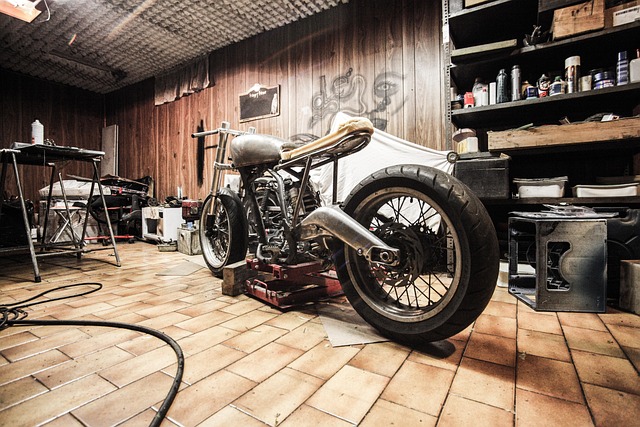Engineering Insight: The Key to Precise, Safe Custom Fabrication Collision Work
Custom fabrication collision work is a specialized field where skilled engineers combine precision a…….
In an era defined by rapid technological evolution and evolving consumer demands, the concept of Custom Fabrication Collision has emerged as a transformative force across various industries. This phenomenon involves the convergence of custom manufacturing processes, advanced technologies, and data-driven insights to create tailored products at scale, challenging traditional production methods. The article aims to unravel the complexities of this topic, offering an in-depth exploration of its definition, global impact, economic implications, technological innovations, regulatory landscape, and future potential. By delving into these aspects, we will provide valuable insights for businesses, policymakers, and enthusiasts alike.
Definition: Custom fabrication collision, at its core, refers to the strategic integration of custom manufacturing techniques with modern technologies and data analytics to produce personalized products efficiently and cost-effectively. It involves combining 3D printing, computer-aided design (CAD), additive manufacturing, and advanced material science to cater to individual consumer preferences.
Key Components:
Custom Manufacturing: This aspect focuses on creating products tailored to specific customer requirements, ensuring precision and unique features. Techniques such as CNC machining, laser cutting, and 3D printing enable the rapid production of customized parts and assemblies.
Advanced Technologies: The integration of technologies like artificial intelligence (AI), machine learning (ML), robotics, and Internet of Things (IoT) plays a pivotal role in optimizing the fabrication process. These technologies enhance design optimization, material selection, and predictive maintenance, leading to increased efficiency and product quality.
Data Analytics: Leveraging big data analytics allows manufacturers to gain insights into consumer preferences, market trends, and production inefficiencies. This information drives informed decision-making, improves product development cycles, and enables personalized marketing strategies.
Historical Context: The concept of custom fabrication collision has evolved over time, driven by several factors:
Industrial Revolution: The advent of industrialization revolutionized manufacturing processes, laying the groundwork for modern customization techniques.
Digital Age: The digital revolution brought about powerful tools like CAD software and 3D printing, enabling designers and engineers to create complex geometries with ease.
E-commerce and Consumer Expectations: The rise of e-commerce platforms has heightened consumer expectations regarding personalized products, leading businesses to adapt their manufacturing strategies.
The influence of custom fabrication collision is a global phenomenon, reshaping industries worldwide:
| Region | Impact and Trends |
|---|---|
| North America | Known for its early adoption of advanced manufacturing technologies, the region leads in 3D printing and additive manufacturing, with companies like GE and Boeing pioneering custom fabrication techniques. |
| Europe | Emphasizing sustainability and innovation, European countries are investing heavily in green manufacturing practices and smart factories, integrating custom fabrication collision to create eco-friendly products. |
| Asia Pacific | Rapid industrialization and a large consumer base drive the adoption of custom fabrication in this region. China, for instance, is becoming a hub for personalized electronics and apparel manufacturing. |
| Middle East & Africa | With a focus on diversifying economies, these regions are embracing advanced manufacturing as a key driver of economic growth, leading to the development of customized products for local and global markets. |
| Latin America | The region’s unique cultural heritage and diverse consumer base foster creativity in custom fabrication, allowing local businesses to cater to niche markets effectively. |
3D Printing Revolution: One of the most significant technological drivers is 3D printing, which has evolved from prototyping to high-volume production. Advanced materials like metal alloys, ceramics, and biocompatible polymers expand its applications.
AI and ML Integration: Artificial intelligence enhances design optimization, material selection, and predictive maintenance. Machine learning algorithms analyze vast data sets to identify patterns, improve product performance, and reduce waste.
Robotics Automation: Industrial robots assist in complex fabrication processes, ensuring precision and consistency. Collaborative robots (cobots) work alongside human operators, increasing productivity and safety.
IoT Connectivity: Internet of Things devices enable real-time monitoring of fabrication processes, inventory management, and predictive analytics, leading to more efficient operations.
The rapid pace of technological advancement in custom fabrication collision has prompted governments and regulatory bodies to establish frameworks that support innovation while ensuring safety, security, and ethical practices:
Intellectual Property Rights: Protecting intellectual property (IP) is crucial for fostering innovation. Patents, copyrights, and trademarks play a vital role in safeguarding designs and technologies related to custom fabrication.
Data Privacy and Security: With the handling of vast amounts of consumer data, regulations like GDPR in Europe and CCPA in California address privacy concerns and enforce secure data management practices.
Product Safety Standards: Organizations such as ISO and ANSI develop standards for additive manufacturing processes, ensuring product quality and safety.
Export Controls and Trade Policies: These policies regulate the export of advanced technologies and dual-use items to prevent their misuse, maintaining national security interests.
Despite its numerous benefits, custom fabrication collision faces several challenges:
High Initial Costs: Implementing advanced manufacturing technologies requires substantial investments, which can be a barrier for small and medium-sized enterprises (SMEs).
Material Sustainability: The development of eco-friendly materials and processes is essential to address environmental concerns related to additive manufacturing’s carbon footprint.
Workforce Skills Gap: The rapid evolution of technology demands specialized skills, creating a shortage of qualified workers and the need for comprehensive training programs.
Data Security and Privacy: As custom fabrication relies heavily on data, ensuring cybersecurity measures and protecting consumer privacy remain critical challenges.
Proposed Solutions:
Government Incentives: Providing tax incentives and grants to SMEs adopting advanced manufacturing technologies can help overcome initial cost barriers.
Public-Private Partnerships: Collaborating with industry leaders and academic institutions can facilitate knowledge sharing, technology development, and training programs to address the skills gap.
Sustainable Material Research: Investing in research and development for sustainable materials and processes will contribute to a greener manufacturing landscape.
Data Security Regulations: Stricter data privacy laws and cybersecurity protocols should be enforced to protect consumer information.
A global medical device manufacturer embraced custom fabrication collision to produce personalized prosthetics and orthotics. By utilizing 3D scanning technology and additive manufacturing, they could create tailored devices for individual patients, improving fit, comfort, and functionality. This approach led to increased patient satisfaction and reduced return rates.
A start-up in sustainable fashion utilized advanced digital printing techniques to produce limited-edition clothing collections. They collaborated with local artisans to incorporate traditional embroidery and patterns into their designs, appealing to environmentally conscious consumers. This case demonstrates how custom fabrication collision can foster creativity and promote ethical production practices.
A leading aerospace company adopted custom fabrication techniques for rapid prototyping of complex aircraft components. This enabled them to test and validate designs faster, reducing time-to-market. The use of advanced materials and 3D printing technology allowed for the creation of lighter, stronger parts, improving fuel efficiency.
The landscape of custom fabrication collision is poised for significant growth and evolution:
Personalized Mass Production: Advanced technologies will enable the production of highly customized products at scalable volumes, bridging the gap between customization and mass manufacturing.
Biomanufacturing: The integration of biology and manufacturing, or biomanufacturing, holds promise in areas like tissue engineering and personalized medicine.
Decentralized Production Networks: Blockchain technology and decentralized production models could revolutionize supply chains, allowing for more efficient, transparent, and localized fabrication.
AI-Driven Design Optimization: Artificial intelligence will play an increasingly vital role in design optimization, material selection, and predictive maintenance, leading to enhanced product performance.
Custom fabrication collision represents a transformative force in the modern manufacturing landscape, reshaping industries globally. Its potential to deliver personalized products at scale while optimizing resources and reducing waste is undeniable. As technology continues to advance and consumer expectations evolve, this phenomenon will only grow in significance.
Addressing the challenges through strategic investments, collaborative efforts, and thoughtful regulation will be crucial for unlocking the full potential of custom fabrication collision. The future holds immense opportunities for innovation, sustainability, and efficiency, with businesses and policymakers playing pivotal roles in shaping this exciting new era of manufacturing.
Q: How does custom fabrication collision differ from traditional manufacturing?
A: Custom fabrication collision combines advanced technologies and data analytics with custom manufacturing techniques to produce tailored products efficiently. Traditional manufacturing often involves mass production, while custom fabrication caters to individual customer requirements.
Q: What are the environmental implications of this technology?
A: While custom fabrication collision offers numerous benefits, its environmental impact is a concern. The development of sustainable materials and processes is essential to minimize the carbon footprint associated with additive manufacturing.
Q: Can small businesses leverage custom fabrication collision?
A: Absolutely! Advanced manufacturing technologies are becoming increasingly accessible to SMEs through partnerships, government incentives, and shared production facilities, enabling them to compete in personalized product markets.
Q: How does AI contribute to this process?
A: Artificial intelligence enhances custom fabrication by optimizing design processes, predicting material properties, and improving maintenance routines. It also enables data-driven insights for personalized marketing strategies.
Q: What are the potential risks associated with decentralized production networks?
A: Decentralized production models offer benefits in terms of efficiency and transparency but may pose challenges related to quality control, intellectual property protection, and supply chain security. Careful consideration and robust regulatory frameworks are necessary to mitigate these risks.

Custom fabrication collision work is a specialized field where skilled engineers combine precision a…….

Custom fabrication collision repairs provide cutting-edge solutions for vehicle restoration, combini…….

Custom fabrication collision services specialize in severe automotive accidents, offering precise re…….

Custom fabrication collision services are vital for restoring custom vehicles and auto bodies to the…….

Restoring complex custom fabrication collision damage is a specialized art demanding advanced engine…….

Custom fabrication collision repair is a meticulous process that transforms damaged vehicles into th…….

Custom fabrication collision repair is a specialized automotive service addressing rare or missing p…….